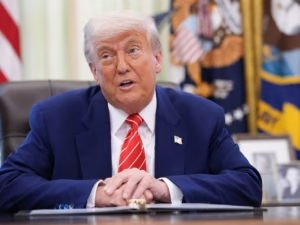introduction
WASHINGTON − In the wake of a recent phone conversation with Russian President Vladimir Putin that yielded no significant advancements toward resolving the ongoing conflict in Ukraine,

President Donald Trump has intensified his rhetoric against the Russian leader.
This escalation in criticism reflects a growing frustration with the lack of diplomatic progress and highlights the complexities of international relations as the war continues to impact global stability.
Trump’s remarks suggest a shift in tone, as he seeks to address the urgent need for a resolution to the crisis while navigating the intricate dynamics of U.S.-Russia relations.
During a recent Cabinet meeting, President Trump expressed his dissatisfaction with Russian President Vladimir Putin, marking the second consecutive day of pointed criticism directed at the Russian leader.
Trump’s remarks underscored a growing tension in U.S.-Russia relations, as he articulated his concerns regarding Putin’s actions and policies.
This public discontent reflects a significant shift in the tone of the administration’s approach to Russia, highlighting the complexities of international diplomacy and the challenges of addressing geopolitical issues in a rapidly changing global landscape.
On July 8, Trump expressed his views on the communications from Russian President Vladimir Putin, stating that much of what is conveyed to them is insincere.
He characterized Putin as consistently polite, yet he implied that this demeanor ultimately lacks substance and significance.
Trump’s remarks suggest a skepticism regarding the authenticity of Putin’s overtures, indicating that beneath the surface charm lies a disconnect from genuine intentions.
This perspective reflects a broader concern about the reliability of diplomatic interactions with leaders who may prioritize strategic manipulation over honest engagement.
In June and again in early July, the leaders engaged in telephone conversations to discuss various matters of mutual interest.
Following these discussions, former President Trump expressed his disappointment, stating that the calls did not yield any significant outcomes or advancements in their agenda.
This sentiment underscores the challenges faced in diplomatic communications, where expectations for productive dialogue can often fall short of reality.
During a dinner on July 7 with Israeli Prime Minister Benjamin Netanyahu, former President Donald Trump expressed his dissatisfaction with Russian President Vladimir Putin, stating that he felt “disappointed” in him.
This remark came alongside a significant policy shift, as Trump announced the reversal of a Pentagon decision that had previously restricted the provision of certain weapons to Ukraine.
This change in stance underscores the complexities of international relations and the ongoing tensions surrounding the conflict in Ukraine, highlighting Trump’s willingness to reassess military support in light of his views on global leadership.
Following a pause in the delivery of military aid, including critical Patriot missile systems, Russian drone assaults on Ukraine escalated significantly.
This delay in weapon shipments was attributed to a comprehensive review of the Defense Department’s inventory, a process that was later reversed by former President Trump.
The Pentagon’s decision to reassess the flow of arms was seen as a strategic move, yet it inadvertently provided an opportunity for increased aggression from Russian forces,
highlighting the complex interplay between military logistics and geopolitical tensions in the region.
During a recent Cabinet meeting, Trump expressed his discontent with President Putin, stating unequivocally that he is not pleased with the Russian leader’s actions.
He highlighted the grave consequences of Putin’s decisions, noting that many lives are being lost as a result of his military strategies, including the deaths of numerous Russian soldiers.
This candid acknowledgment underscores the serios implications of the ongoing conflict and reflects a broader concern regarding the humanitarian impact of such warfare.